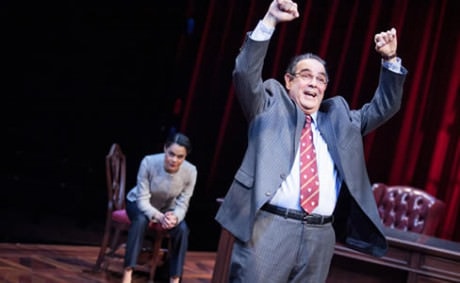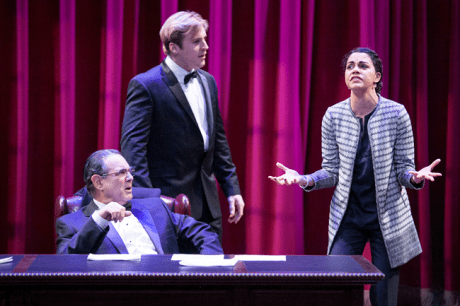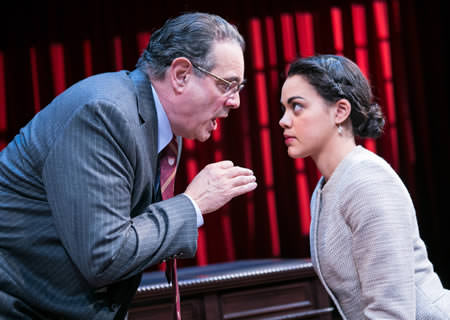Over 2500 years ago, Aristophanes put “living” contemporary power-brokers into his comic masterpieces and then skewered them with their own foibles. The results were scandalous and provocative.
Then the power-brokers forbade the practice, for obvious reasons; the practice has remained forbidden for thousands of years, particularly as the Roman Empire and its descendants spread their reign terror throughout Europe and the world.
In John Strands’ new play, The Originalist, at Arena Stage’s Kogod Cradle Theatre, Supreme Court Justice Antonin Scalia steps center stage. Fortunately for Scalia, Strand does not skewer “the monster,” as he is jokingly called, but humanizes him.

He transforms this judicial reactionary who sees money as speech, healthcare as a privilege, unions as the enemy, gay folks as Sodomites, and liberals as worthy of the deepest pit of hell, into a veritable Teddy Bear with a tin heart.
You might not agree with Arena or John Strand’s assessment of the man and his legacy — as I don’t — but you will definitely leave this excellent production with a profound sense of just how powerful drama can be at shaping our perception of leaders and the world.
In Antonin Scalia’s way of seeing the world, performed with lovable bombast by Edward Gero, “the text” exists only on its original parchment, written as it were in the blood of its authors. Hence, the play’s title, a reflection of Scalia’s judicial philosophy, originalism.
Only the author’s historical intent will reveal the text’s true meaning. Akin to way zealots interpret sacred text within fundamentalist religions, Scalia looks at the U.S. Constitution as an-end-in-itself, a sacred language without human repercussions.
Thus, for Scalia, the meaning of “A well regulated militia being necessary to the security of a free state, the right of the people to keep and bear arms shall not be infringed” is rooted not in the existence of the QBZ-95 Assault Rifles or school shootings where dozens of 1st graders are butchered by a teenage but in self-regulated and self-equipped American Minutemen who pick up their long rifles and, using guerrilla-style tactics, win independence by defeating the imperial British army.
Strand pits his original originalist, Scalia, against a young “flaming” liberal, lesbian, African-American law clerk named Cat. Kerry Warren’s Cat matches Gero’s Scalia heart to head so to speak, in a fierce knockdown debate.
The script ultimately shifts from a generalized debate about Scalia’s legal philosophy to his stance on DOMA, (Defense of Marriage Act). Scalia asks Cat to write his legal opinion on DOMA and the morphing of teacher and student begins.
This head versus heart struggle forms the essence of the script, allowing Scalia to make his top-notch legal arguments as Cat makes her emotional appeals, be it for the victims of gun violence or for gays wanting to marry.
This head versus heart struggle is also the script’s central flaw in that it does not allow Cat to really argue against Scalia on legal grounds. All she is allowed to do is make emotional appeal after emotional appeal. It is as if Scalia and, thus, reactionary Republicans, have the only sound legal argument in the debate whereas liberals are left to pluck heart strings and moan about people’s suffering.

Ms. Warren’s performance is superb, however, allowing her “artsy” Cat to appear as fiercely intellectual. Thus, the audience remains engaged by her emotional counter-punches even if they are without legal support.
The third character in Strand’s drama is one of Cat’s fellow Harvard graduates, an ambitious young Republican named Brad. Harlan Work gives the conservative idolizer of Scalia all the sap necessary to contrast his chicken-hawk wimpishness with her fiery passion. Given a choice over personality and character, it is easy to see why Scalia would choose Cat.
Ironically, however, Brad with his privileged, moneyed existence is exactly the kind of person that Scalia’s judicial “philosophy” will end up empowering: the rich continue to get richer and the privileged continue to gain more privilege while the weak and poor continue to slip into utter invisibility without the money to “speak.”
Molly Smith directs, and the pace of the show is spot on perfect; its varied levels of tension and humor never weary the audience.
Her design team has also done an excellent job. Set Designer Misha Kackman has transformed the Kogod into a thrust stage with chandeliers, and a solid oakish desk, and a firing range. Colin K. Bills has joined in as lighting designer, contributing a locale: a light created hospital room with bed. Joseph P. Salasovich’s costumes add local color and a theatrical flare.
If you didn’t know the truth about contemporary America, you’d leave the theatre thinking that the Republicans and their passionate ideology were losing ground in the 21st century. Of course, we all know that the truth is exactly the opposite; they are not only in control of almost all the legislative state houses and court systems locally and nationally, but when they win the presidency in 2016, their domination of the American political system will be complete. An American oligarchy will have won.
In reader response theory the text exists only as ink on paper. Rather, the real text — the one where those symbolic words take on meaning — that “text” takes shape somewhere between the printed words on the page and in the reader’s mind. In that shared space, the meaning of language becomes tangible.
Certainly, something similar takes place in the theatre. We see the show unfold, and the playwright and the production team offer us their vision of the world.
Like Scalia, we too can be originalists; we can see the production as definitive, with the artists’ intentions being the final word.
Or we can practice a little audience-response theory and talk back to the artists: we can tell them when their good intentions might not serve their hoped for results.
Is this lovable, pure-hearted Scalia really what they want us to see? Do they really intend to say that a victory over DOMA means that the reactionaries have been stopped?
Do liberals need to put it all on the line — learn how to fire a gun and bust a few heads?

Running Time: One hour and 45 minutes, without an intermission.
The Originalist plays through April 26, 2015 at the Kogol Cradle at Arena Stage at the Mead Center for American Theater – 1101 Sixth Street SW, in Washington, DC. For tickets, call the box office at (202) 488-3300, or purchase them online.
RATING:




